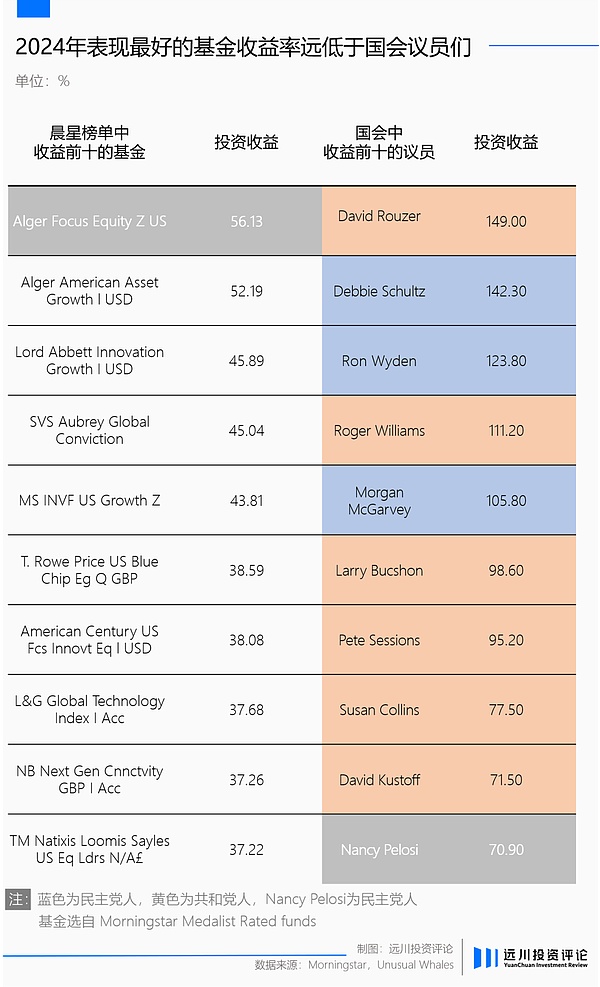
Author: Wu Wentao
When the domestic financial circle is popular on the way from “golden rice bowl” to “iron rice bowl”, American lawmakers have shown their investment strength that is superior to Wall Street.
Former U.S. Speaker Pelosi, known as the Capitol Hill stock god, showed another wave of investment operations with a 70.9% yield in 2024.Although she is still 40% above the “national fortune index” Nasdaq, she is only ranked tenth among the members of Congress.Republican Rep. David Lauze won the championship with an annual rate of return of 149% with Nvidia’s holdings.
In contrast, the top ten funds in the United States selected by Morningstar in 2024 have a return of only 56.13%. In the world of Capitol Hill, you can’t even get your own number card.

If the excellence of the case is not enough to portray the Capitol Hill image, Unusual Whales also counted a set of averages.According to their 2024 Congressional Transaction Report,In 2024, the overall tendency is to hold itTechnology stocksDemocratic lawmakersAverage rate of returnAt 31%, the average rate of return of Republican lawmakers who prefer to hold finance and commodities is 26%, slightly inferior.But the average yields in both parties exceeded the S&P 500’s 24.9% increase.
“Battle against the index” is a very challenging thing for Buffett.But when it comes to the lawmakers whose main business is legislation, they can easily develop the side business of stock trading to the point where professional institutions are ashamed.
Although behind the yields of lawmakers, there are also many controversies from public opinion that they question their “insider trading”.But the situation not only did not reverse, but instead turned into a more dramatic scene in 2025.
In early April, when the entire US capital market was trembling in the face of sudden “reciprocal tariffs”, it was hard for Wall Street to think that President Trump would personally post an annual tweet on Truth Social on April 9 – “THIS IS A GREAT TIME TO BUY!!!” and then four hours later, it officially announced that it would suspend the implementation of “reciprocal tariffs” on 75 countries for 90 days, and the US stock market rose sharply.
As the financial center moves from Wall Street to Washington, anxiety belongs to the New Yorker.After all, the higher the uncertainty in Washington, the greater the information gap among lawmakers on Capitol Hill.
A heart-warming “coincidence”
During the investment process of US Capitol Hill members, coincidences always happen inadvertently.
For example, Democratic Rep. Debbie Schultz’s portfolio hit a yield second only to Rouzer. As a senior member of the Representatives’ Military Construction Appropriations Subcommittee, Viasat, the satellite operator she bought, has received more than $2.7 billion in government contracts since fiscal 2020, with the main client being the Department of Defense; for example, Republican Rep. Dan Newhouse, a member of the Homeland Security Appropriations Subcommittee, bought shares of RTX, one of the government’s largest contractors, in April 2024.
Rep. Marjorie Taylor Greene’s operations were even more accurate. On April 8, 2025, he purchased stocks such as Amazon and Lululemon that fell more due to reciprocal tariffs. The next day, he further bought technology stocks such as Nvidia, including $21,000 to $315,000.And it all happened before Trump posted a post saying “THIS IS A GREAT TIME TO BUY”.
However, compared to what Senator Richard Burr did in 2020, the Representatives only made a limited amount of information on the periphery of Capitol Hill.
On February 27, 2020, on the eve of the outbreak of the new crown epidemic, U.S. President Trump claimed that the virus may be seasonal.”It will go away. Like a miracle, one day it will go away,” he added, “of course, it may get worse before things get better.”
U.S. Senator Richard Burr obviously disagrees with this.On the 13th of that month, it sold personal stocks worth US$628,000 to US$1.72 million through 33 separate transactions, including a large number of industries such as tourism and hotels that were more affected by the epidemic.On the eve of the market’s plunge, the number of shares he sold in a single day reached a record high in nearly 14 months.
Things are much more than that, on the same day the President appeased the people, Richard Burr also participated in a show calledCapitol Hill ClubLunch party.The guests at the event represented companies and organizations from different industries in North Carolina, and they all had one thing in common:These companies or their political committees donated more than $100,000 to Burr’s campaign in 2015 and 2016.
According to a recording of secret remarks released by NPR, Richard Burr further explained the severity of the new crown epidemic at a lunch meeting.“It spreads much more radical than anything we have seen in recent history,” says Richard Burr. “It may be more similar to the 1918 pandemic [2].”
At the same time, Richard Burr made several judgments at the meeting without any idea:
1) Traveling in Europe can become dangerous;
2) Some community schools in North Carolina may be closed;
3) Military hospitals may be used to fight the epidemic.
Coincidentally, these predictions eventually became reality.Thirteen days later, the State Department began warning against traveling to Europe; 16 days later, North Carolina closed schools due to the threat of coronavirus; three weeks later, the public began to know the possibility of military hospitals being requisitioned.
If all the clues are linked, it is difficult not to make such an association: after Richard Burr knew the severity of the epidemic in advance, he not only sold his assets first, but also informed his supporters who helped him run in advance before the public knew the news.
Seeing the situation getting worse, Richard Burr finally resigned from his position as chairman of the Senate Intelligence Committee on May 15, 2020 under pressure from public opinion.
For members of Congress, in order to get the job that has not changed for fifteen years and totaled $174,000, they not only have to spend a lot of time and energy, but also raise millions of dollars in campaign funds to finally get an opportunity to serve the American people.But from another perspective, the amount of money that Richard Burr sold during the epidemic is at least his four years of salary income.
Although Richard Burr has now left Capitol Hill, Richard Burr-style law on member investment is still being staged in every corner of Congress.Especially when the macro situation begins to severely affect the expectations and valuations of the US capital market, isn’t tariffs also a variant of the “epidemic era”?
Although in order to avoid insider trading by members of Congress, the United States has also tried to introduce relevant bills, such as the STOCK bill promulgated in 2012, which is a bill specifically formulated for members of Congress to make profits by using insider information.But when lawmakers are going to vote for a bill that restricts themselves from making money from their side jobs, the outcome is already destined.
A bill that is in name only
The culture of MPs’ stock trading is not a secret in the United States.In 2011, a U.S. column called “60 minutes” revealed to the public the inside story of “congressional members legally using non-public information they obtained during their official duties to trade.”
Peter Schweizer, a researcher at Stanford University, broke the news in the column:The third day after the Lehman Brothers collapsed in 2008,The Treasury Secretary and the Federal Reserve Chairman gave members a closed-door briefing on the economic situation, and members of Congress also launched a series of stock transactions after the meeting.
In particular, Spencer Bakus, one of the members of the House of Representatives, bought options that fell in the market the day after the meeting and eventually made a huge profit.
Facing Peter Schweitzer’s revelation, Bachus defended: “I don’t feel guilty for being a good investor. The reason I can make such a judgment is because I am one of the best investors around [3].”
Spencer Bakus insists that he has never used non-public information to trade, but this obviously cannot convince the public.According to a poll at the time, only 9% of the people were satisfied with the performance of Congress, setting a record low [4].
At that time, the time came when the U.S. Congress was re-election election. In order to gain the support of voters, members of Congress, who were deeply involved in insider trading scandals, dug out the STOCK bill that had been drafted as early as 2006 but was not passed, and it was officially signed by Obama, then-US President, on April 4, 2012.
It is worth mentioning thatvoteDuring the session, most of the senators favored the adoption of the plan, and only three members voted against it.During the epidemicMake a big profitThe protagonist Richard Burr is one of them.
But the core of the STOCK Act is not to prohibit transactions but to mandatory disclosure, which clearly requires members of Congress and their spouses to disclose transactions of more than $1,000 within 45 days.On the other hand, the STOCK bill is not very penalties, and the first penalty faced by lawmakers who did not disclose it on time is only a fine of $200.
During the actual implementation process, the punishment information of the lawmakers will not be disclosed to everyone.At least 78 lawmakers were found delaying filing stock transactions between 2020 and 2022, but no one knew whether they were fined $200 for violations [5].
More importantly, even though members of Congress, including Nancy Pelosi and Richard Burr, have been widely questioned for suspected insider trading, since its inception, no member of Congress and senior executive member has been charged with violating the STOCK bill.
Chris Collins, one of the few convicted of insider trading, was also charged with asking his son to sell the relevant stocks in advance while serving as a director of a pharmaceutical company, before knowing the company’s drug development results before the market, which violated the U.S. Securities Law.
In July 2024, senators from both parties jointly proposed a bill called ETHICS, whose full name is Ending Trading and Holdings in Congressional Stocks, aiming to prohibit members of Congress, their spouses and minor children from trading individual stocks.
The bill has made thoughtful transition period arrangements, requiring incumbent members to immediately stop purchasing new stocks and divest all personal stock assets at the beginning of the next Congress in March 2027.Violators of the ban are required to pay 10% of their monthly salary or 10% of the value of the illegal assets (the higher).
However, the relatively moderate STOCK bill was pending for six years from its introduction in 2006 to its passage in 2012.Now, before the ETHICS proposed in July last year has been updated, the stock gods on Capitol Hill have iterated another version.
From the 2008 financial crisis, when lawmakers made profits in trading before bank bankruptcy, to the 2020 COVID-19 pandemic, when lawmakers sold out before the outbreak was uncontrollable, to the 2025 tariff shock, when the president and lawmakers were in the stock market, turning their hands together to turn clouds and rain, nothing can sum up the investment philosophy of Capitol Hill like “the bigger the wind and waves, the more expensive the fish.”
end
Buffett once said that his investment principles have three: “First, don’t lose money; second, don’t lose money; third, always remember the first two.” For the members of Capitol Hill, preserving the principal is also their first principle before facing major events.
byRichard Burr as an example. On the eve of the 2008 financial crisis, he told the public not to panic, and asked his wife to withdraw all deposits from the bank, avoiding the possible stampede caused by the financial crisis. On the eve of the outbreak of the epidemic in 2020, he also comforted voters while selling related stocks affected by the epidemic, avoiding the losses caused by the subsequent stock market circuit breaker.
“Persist in the circle of competence” is another principle for many lawmakers.
For example, Rick Allen, a member of the House Education and Labor Committee who promotes the Prescription Drug Pricing Act, will buy and sell stocks related to pharmaceutical companies; Rep. Cindy Axon, a Democrat of the House Financial Services Committee, will favor bank stocks; Rep. Alan Lowental, a Democrat who promotes renewable energy legislation, has bought and sold solar enterprise stocks 97 times between 2019 and 2021.[6]
Overall, in terms of investment principles, lawmakers first do not lose money, and then stick to their capabilities, which is comparable to Buffett’s textbook-level investment guide.However, the real stock god relies on the ability to analyze public financial reports to gain respect from investors around the world, while the lawmakers have received widespread doubts in the closed-door briefings.
Although Pelosi once defended Congressional stock trading with confidence – “This is a free market economy, and lawmakers should have the right to participate”, in the eyes of ordinary people, Capitol Hill always has an unattainable advantage, that is, people have already got the answer before they see the test paper.

References:
[1] Congressional Stock Trades Get Scrutiny, NPROne of Trump’s billionaire supporters has harsh words for the president about his trade war, CNN
[4] The game of power and money – an insider trading of American officials, Xinhuanet
[7]Dozens of lawmakers beat stock market in 2024: Report, THE HILL
[8]Marjorie Taylor Greene faces scrutiny over stock trades before town hall, FOX 5








